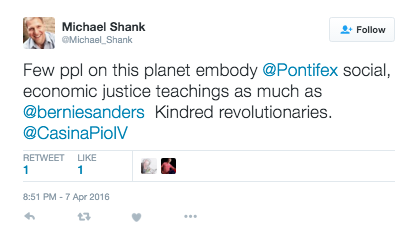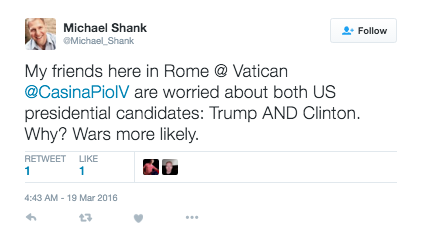It’s the Friday before the election. There’s little that can happen between now and the close of polls Tuesday night that will change the results of the presidential election. The Clinton campaign could fail to effectively execute its get out the vote operation (unlikely). There could be some massive external event, like terrorism or a cyber attack (unlikely but unfortunately far from implausible). But short of such unlikely events, Hillary Clinton should win, probably by a comfortable margin. Similarly, Democrats should win enough races to flip control and put Charles Schumer in charge of the Senate.
The House of Representatives is probably as settled a matter as the White House and Senate. Gerrymandering, incumbency, Republican money shifting from Trump to down-ballot races, and few Republican-held districts in suburban areas with college educated Republicans and Independents made it hard for Democrats to get control. It got even harder when Donald Trump ratcheted down his attacks on Republicans, including Paul Ryan, and FBI Director James Comey’s letter to Congress about something that may or may not pertain to Clinton’s emails energized Republicans and probably tamped down the size of Clinton’s victory, thus minimizing a coattail effect. The few things that Democrats could do to change results. Nevertheless, Democrats should go for broke and try to win the House.
A Republican House could be catastrophic. But the risks of a last-minute lunge for the House are minimal. With a likely surge in Latino voters, and the possibility of defections by Republican women and the possible effects that could have down-ballot, they might even get lucky. Control of the House may determine the fate of Hillary Clinton’s presidency. A Democratic House would kill the possibility of endless investigations, and could drive a stake in the heart of the current incarnation of the Republican party. For the next four days, Democrats should do everything they can to win the House.
A last-minute drive for the House is severely limited by what Democrats can’t do. It is too late to get on TV or to send mail. Voting in many races is nearly done, because of early voting or, as in Oregon and Colorado, elections conducted almost entirely by mail-in ballot. It is too late to build a field operation where none exists. But there are a few things Democrats could do to nibble in to Republican margins. And a few places where Democrats would have a better chance of surprising Republicans.
Most of what Democrats could do at this point is over the phones. And that’s usually not that effective. But one possibility is using phone vendors with well-trained callers delivering a persuasion message to a narrowly universe of voters targeted as mostly likely to change their vote, or to ensure they vote for the Democrat rather than stop voting at President. Vendors who do these calls are mostly at capacity already, but some reserve extra capacity for campaigns with few ways to spend unexpected windfalls.
Robocalls with recorded messages have a very small effect. But they’re dirt cheap, can be set up and in the field in a matter of a few hours, and messages from, say, Bernie Sanders or Michelle Obama or a powerful celebrity backer might be noticed and add a few votes to the Democrats’ column. It is probably too later for digital adds, but if not, they could be tossed in to the mix.
Another thing Democrats can do is use the press. Clinton, Tim Kaine, and their main surrogates (Barack and Michelle Obama and Joe Biden) have been using Clinton rallies to take shots at Republican senators. These hits, such as the President’s swipes at Marco Rubio, have been noted in press coverage. Hits on House Republicans could be worked in to their speeches. And people like Sanders or Biden could even do call in radio interviews in the markets of the targeted Congressmen to make the argument against their reelection.
Many Senate and Congressional Republicans will have to run several points ahead of Trump to win. Some voters will pick Clinton because they loathe Trump, then vote Republican for Congress to constrain Clinton. But recent Democracy Corps poll by Democratic pollster Stan Greenberg showed a big opportunity for Congressional Democrats. On the generic ballot, Democrats had a 47-39 edge. But when asked if they wanted the next Congress to work with Clinton to address the country’s problems, or to stop her from advancing her agenda, working together was favored 58-38. Highlighting their connection with Trump and criticizing them for vowing to block Clinton from accomplishing anything could be a potent message for Clinton voters pondering splitting their ticket. The Greenberg poll was before the Comey letter, so that message may not work as well now. But if Dems are targeting races that they know they would otherwise lose, it’s worth the effort.
Finally, there’s the matter of where to focus. Democrats would avoid states that have already mostly voted. Their efforts would have less of an effect in presidential battleground states, where the Clinton campaign already has massive field organizing and get out the vote operations. But there are numerous potentially competitive races in New York, where Schumer isn’t seriously challenged, and the presidential candidates aren’t campaigning, a the little bit of campaigning would have a slightly larger effect.
There are individual districts scattered around, in Kansas, in Minnesota, in New Jersey, where Democrats might steal a seat. But the big pool of potential seats in California. We might know Clinton won while polls in California are still open, possibly depressing Republican turnout. But the main thing depressing Republican turnout will be a Senate race between two Democrats, and no chance Trump could win California. With a likely surge in Latino turnout, plus growth of Latino populations in many Republican congressional districts, Democrats could get lucky. They could dump phone calls in to nearly every district, regardless of how Republican it is, as long as there is a Democrat on the ballot.
Getting lucky is probably the only way Democrats will win the House. Maybe the odds are currently 2%, and everything they could do would only increase the odds to 3%. But given that a Republican-controlled House will probably lead us in to a Constitutional crisis, it is worth the shot.



